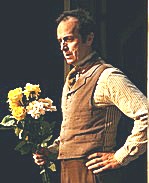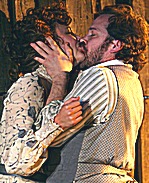SITE GUIDE
SEARCH
REVIEWS
REVIEW ARCHIVES
ADVERTISING AT CURTAINUP
FEATURES
NEWS
Etcetera and
Short Term Listings
LISTINGS
Broadway
Off-Broadway
NYC Restaurants
BOOKS and CDs
OTHER PLACES
Berkshires
London
California
New Jersey
Philadelphia
Elsewhere
QUOTES
TKTS
PLAYWRIGHTS' ALBUMS
LETTERS TO EDITOR
FILM
LINKS
MISCELLANEOUS
Free Updates
Masthead
A CurtainUp Review
Uncle Vanya
By Elyse Sommer
|
Soon the rain will pass and everything in nature is refreshed and revived. Everything breathes anew. I alone am not refreshed by the storm. Day and Night one thought haunts me like an apparition, the thought that my life is lost beyond hope. There is no past it has been wasted on nonsense and the present is terrifying in its absurdity. .— Vanya.
|

Denis O'Hare as Uncle Vanya
(Photo: Joan Marcus) |
While I've never quite settled on which of the four jewels in Chekhov's crown is my favorite, my heart probably goes out most to Vanya and his niece Sofya (a.k.a. Sonya), who could make Astrov happy if only this ahead-of-his-time environmentalist could respond to her inner beauty with the passion he feels for his beloved forest. Each new interpretation of these characters and the unhappy May-December couple whose presence has such a strong effect on all of them offers new potential for imaginative staging and performances— and for bringing out the comedy that accentuates the tragedy of coming smack up against time's inevitable passing accompanied by shattered hopes and dreams.

Maggy Gyllenhaal and Peter Sarsgaard in Uncle Vanya
(Photo: Joan Marcus) |
Even if a production doesn't live up to one's expectations 100%, Uncle Vanya is one of those plays that continues to grow on one so that is affective even when less than perfect. Denis O'Hare's extremely idiosyncratic performance is intriguing even if it at times pushes the comedic envelope a bit too hard. Though his interpretation takes some getting used to it does catch fire, especially when he expresses his disgust with his brother-in-law and himself, a disgust that in his final big scene explodes into impotent rage that pulls us into his dark vision of the self-inflicted life sentence of dreary, unfulfilling days — a fate which when finally embraced by the gentle Sofya is sheer poetry in the Rocamora translation.
Unfortunately, some of Rocamora's finely tuned text falls victim to director Austin Pendleton's frequently positioning the actors without any regard for the audience and encouraging a too conversational tone. Pendleton knows his Chekhov, having himself played Vanya, but his direction is at times as inconsiderate of the audience as the egotistical Professor's demands for tea and sympathy in the middle of the night.
Santo Loquasto, who has designed two previous production of this play (one for Pendleton at the Willimastown Theatre Festival) and usually delivers beautiful and completely appropriate sets, hasn't helped matters with an open wooden structure that aims to create the inside and outside locales mainly through different height levels. Interesting. But impractical. Maybe if this were a deconstructed Chekhov (shades of Ivo van Hove's high concept classics at New York Theater Workshop) and in a different space this would work. As it is, the set doesn't fulfill Loquasto's aim and presents sight and sound difficulties for anyone unfortunate enough to have seats in the thrust sections (especially the one on the furthest side). This design also fails to give us enough of a sense of the outdoors that's very much part of the relationship between the estate's interior and exterior.
George Morfogen, an actor who seems to fit whatever assignment he's given, here plays the professor of limited intellectual gifts and overwhelming selfishness. What's most interesting about this character, no matter who plays him, is that though he so strongly affects everyone's emotional state, romantic feelings and even their financial situation, his stage time is limited; consequently the smallness of the role never fails to surprise. Delphi Harrington as Voynitskaya, the woman who puts her son-in-law (the Professor) before her son, is another influential but surprisingly minor player. She is so regally distant and silent that it almost seems as if some of her dialogue has been cut. But you don't need a big role to make a strong impression, as do Louis Zorich, the impoverished landowner Telegin who has taken up residence on the Serebryakov estate and Cyrilla Baer as the old nanny. Both are the epitome of the characters who lend color and, well, Russian-ness, to Chekhov's plays.
As for the younger and star players. . . Maggie Gyllenhaal not only looks stunning in Suzi Benzinger's costumes but plays Yelena with exquisite ennui. She also delivers her lines with admirable clarity. Peter Saarsgard's Astrov may not look like a man who's aged visibly and is teetering on the brink of alcoholism, but somehow his being trim and quite attractive, makes Yelena's and Sofya's attraction to him most convincing. His passion for Yelena turns him as wild as Vanya, leading him to neglect his duties and make what must surely be the longest house call on record.
Pendleton's major failure as the play's helmer is that he hasn't guided Mamie Gummer to project her voice. The too conversational tone encouraged for all is in Gummer's case a consistent whisper that turns the audience into eavesdroppers who have to strain to hear her even when just a few rows away. With her blonde hair pulled back into a tight, spinster-ish knot Gummer, who looks a lot like her mom (Meryl Streep), does convey Sofyia's unrequited love for Astrov convincing enough to make your heart break for her when her gorgeous stepmother thoughlessly compliments her appearance with "You have lovely hair."
To sum up, O'Hare's quirks do grow into a touching Vanya. Gyllenhaal and Saaskard's Yelena and Astrov contribute a refreshing sensual aura. And so, despite some of the shortcomings of Mr. Pendleton's direction and Mr. Loquato's set, the enduring power of Chekhov's play carries the day.
For more about Chekhov and links to other reviews of his plays, including various productions of Uncle Vanya, see our Chekhov backgrounder
|
Uncle Vanya By Anton Chekhov Translated by Carol Rocamora Directed by Austin Pendleton Cast: Denis O'Hare (Vanya-Ivan Petrovich Voynitsky), Mamie Gummer (Sofya Aleksandrova), Maggie Gyllenhaal (Yelena Adreevna), Peter Sarsgaard {Astrov, Mikhail Lvovich), Louis Zorich (Telegin, Ilya Ilyvich), George Morfogen (Serebryakov, Aleksandre Vladirimovich), Delphi Harrington (Maria Vasilyevna Voynitskaya), Cyrilla Baer (Marina) Sets: Santo Loquasto Costumes: Suzy Benzinger Lighting: Jason Lyons Sound: Ryan Rumery & Daniel Baker Hair design: Paul Huntley Stage Manager: Jared T. Carey Running Time: 2 1/2 hours, including intermission Classic Stage, 136 East 13th www.classicstage.org, (866) 811-4111 Tuesday through Fridays at 8pm; Saturdays at 2pm and 8pm and Sundays at 2pm. Tickets are $70 and $75 From 1/17/09; opening 2/12/09; closing 3/08/09 Reviewed by Elyse Sommer at 2/07/09 press performance |
|
REVIEW FEEDBACK Highlight one of the responses below and click "copy" or"CTRL+C"
Paste the highlighted text into the subject line (CTRL+ V): Feel free to add detailed comments in the body of the email. . .also the names and emails of any friends to whom you'd like us to forward a copy of this review. You can also contact us at Curtainup at Facebook or Curtainup at Twitter |
Try onlineseats.com for great seats to
Wicked
Jersey Boys
The Little Mermaid
Lion King
Shrek The Musical

South Pacific

In the Heights

Playbill 2007-08 Yearbook

Leonard Maltin's 2008 Movie Guide


Wicked
Jersey Boys
The Little Mermaid
Lion King
Shrek The Musical

South Pacific

In the Heights

Playbill 2007-08 Yearbook

Leonard Maltin's 2008 Movie Guide


